Unit 2 Topic 1 Section B
七年级英语上册Unit2Topic1SectionB教案仁爱版
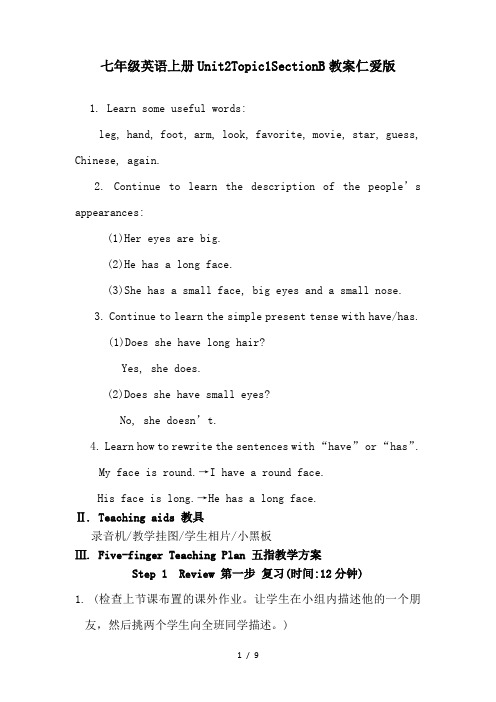
七年级英语上册Unit2Topic1SectionB教案仁爱版1. Learn some useful words:leg, hand, foot, arm, look, favorite, movie, star, guess, Chinese, again.2. Continue to learn the description of the people’s appearances:(1)Her eyes are big.(2)He has a long face.(3)She has a small face, big eyes and a small nose.3. Continue to learn the simple present tense with have/has.(1)Does she have long hair?Yes, she does.(2)Does she have small eyes?No, she doesn’t.4. Learn how to rewrite the sentences with “have” or “has”.My face is round.→I have a round face.His face is long.→He has a long face.Ⅱ. Teaching aids 教具录音机/教学挂图/学生相片/小黑板Ⅲ. Five-finger Teaching Plan 五指教学方案Step 1 Review 第一步复习(时间:12分钟)1. (检查上节课布置的课外作业。
让学生在小组内描述他的一个朋友,然后挑两个学生向全班同学描述。
)2. (利用“Touch Your Body”竞赛游戏复习学过的表达身体各部位的名词,板书几个生词。
游戏步骤:(1)以组为单位参加竞赛,先要求全组学生站立、其他组监督。
(2)把食指放在鼻子上,根据不同的指示触摸;(3)出错的同学坐下,最后看一下哪一组站着的学生多就胜出。
仁爱版八年级英语上册Unit2Topic1.SectionB教学设计
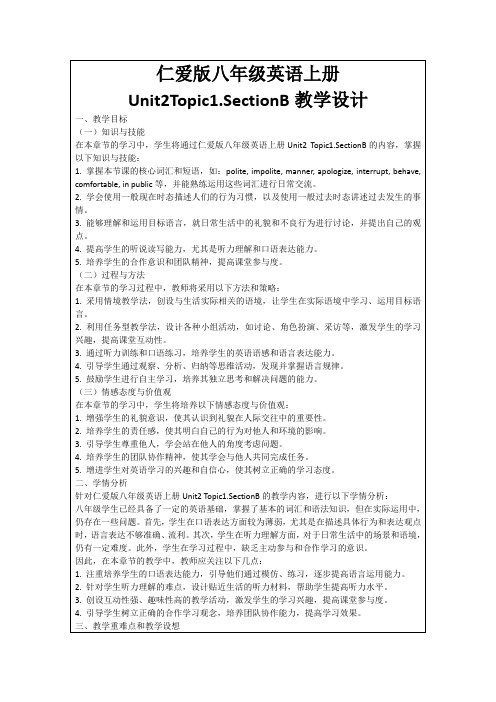
-教师给予反馈、指导,帮助学生查漏补缺。
(五)总结归纳
1.教学活动设计:
-教师引导学生回顾本节课所学内容,总结知识点。
-学生分享学习收获,教师给予评价、鼓励。
2.教学目标:
-帮助学生巩固所学知识,形成知识体系。
-提高学生的学习自信心,激发学习兴趣。
3.教学过程:
2.学会使用一般现在时态描述人们的行为习惯,以及使用一般过去时态讲述过去发生的事情。
3.能够理解和运用目标语言,就日常生活中的礼貌和不良行为进行讨论,并提出自己的观点。
4.提高学生的听说读写能力,尤其是听力理解和口语表达能力。
5.培养学生的合作意识和团队精神,提高课堂参与度。
(二)过程与方法
在本章节的学习过程中,教师将采用以下方法和策略:
-教师引导学生回顾本节课所学词汇、语法、听力等知识点。
-学生分享学习收获,教师给予积极评价、鼓励。
-布置课后作业,为下一节课的学习做好铺垫。
五、作业布置
针对仁爱版八年级英语上册Unit2 Topic1.SectionB的教学内容,以下为作业布巩固所学词汇、语法知识。
-引导学生从文化角度认识礼貌行为的重要性,培养其良好的跨文化交际能力。
四、教学内容与过程
(一)导入新课
1.教学活动设计:
-利用图片、视频等多媒体资源,展示日常生活中礼貌和不良行为的场景,引导学生关注和思考。
-邀请学生分享自己在生活中遇到的不礼貌行为及感受,激发学生对本节课主题的兴趣。
2.教学目标:
-引起学生对礼貌行为的关注,激发学习兴趣。
4.鼓励学生互相交流、讨论,共同完成作业,培养合作精神。
-通过小组讨论,让学生分享自己遇到的不礼貌行为及感受,激发学生的学习动机。
仁爱版七年级英语上册Unit2topic1SectionB教案

Section BThe main activities are 1a, 3 and 4. 本课重点活动是1a、3和4。
Ⅰ. Teaching aims and demands 教学目标1. Learn some new words:favorite, movie, star, Chinese, again, look, arm, hand, leg, foot2. Learn some useful sentences:(1)—Who is your favorite movie star?—It’s Bruce Lee.(2)Guess again.3. Continue to learn the description of people’s appearances:(1)Her eyes are small.(2)She has a small face, big eyes and a small nose.4. Continue to learn the simple present tense with have/has:(1)—Does he have long hair?—No, he doesn’t.(2)—Does he have a wide mouth?—Yes, he does.Ⅱ. Teaching aids 教具教学挂图/录音机/学生照片/小黑板Ⅲ. Five-finger Teaching Plan 五指教学方案Step 1 Review 第一步复习(时间:9分钟)通过复习上节课的目标语言,引出并学习本节课新句型。
训练学生的口头表达能力。
1. (检查上节课布置的课外作业。
教师把学生分成十二个小组,让学生在小组内描述他的一个朋友,然后请两个学生向全班同学描述。
教师要及时给予表扬。
)T: Hello, boys and girls. From last period, we learnt how to describe someone’s appearance. Now I’ll divide our class into twelve groups. Then you talk about your friend’s looks in groups. You can begin like this: I have a friend. He is a boy. He has … And then I will choose two of you to report it in the front.2. (教师出示28页5a的教学挂图,请八名学生依次到黑板前,按教师指令,触摸玩具的身体部位,并要求学生在黑板上写出相对应的单词。
仁爱版九年级英语上册Unit2Topic1SectionB教案

仁爱版九年级英语上册Unit2Topic1SectionB教案Unit 2 Saving the EarthTopic 1 Section B教案教学目标1.知识与能力目标Words and phrases: pain, produce, awful, bear, harmful, chest, editor, breathe/breath, soil get a pain in…, what’s worse, too much noise, too many problems, breathing problem, be harmful to, make a mess of, throw…aroundSentences: It’s difficult for me to breathe./ I’ve got a pain in my throat./ It’s really awful.A: How long have you been like this? A: Have you seen a doctor?B: I’ve been like this since la st week. B: Not yet.Grammar: Present Perfect (past participle和疑问句的问答).2.过程与方法通过谈论环境问题,让学生了解不同种类的污染及其危害。
3.情感态度与价值观引导学生关注环境问题,树立绿色环保意识,增强忧患意识和社会责任感。
教学重点1. some new words and useful phrases; the present perfect tense2. the present perfect tense教学过程Step 1 Review1. go over the phrases in section A2. Guide the Ss to discuss different kinds of pollution ingroups and share the answer together. Step 2 Presentation1. Watch the flash, then answer the questions below.1) Does Bruce look well?2) What’s wrong with him?3) How long has he been like this?4) Has he seen a doctor?2. Show a picture of the polluted West Hill, let the Ss listen to 1a once and tick the questions they hear in part A of 1b. Then check the answers together.A. Listen to 1a and check the questions you hear.1) What’s wrong with you?2) How long have you been like this?3) Where have you been?4) Have you seen a doctor?5) Have you noticed the dead fish in the river?B. Listen again and match each question above with an answer below.3. Read 1a and answer the questions.1) What caused Mrs. Zhou’s problems?2) What will Kangkang do?Step 3 Consolidation1.分角色朗读2a,选择四组进行比赛,激发学生朗读兴趣。
八年级上册Unit1--Unit2重点短语,句子默写版
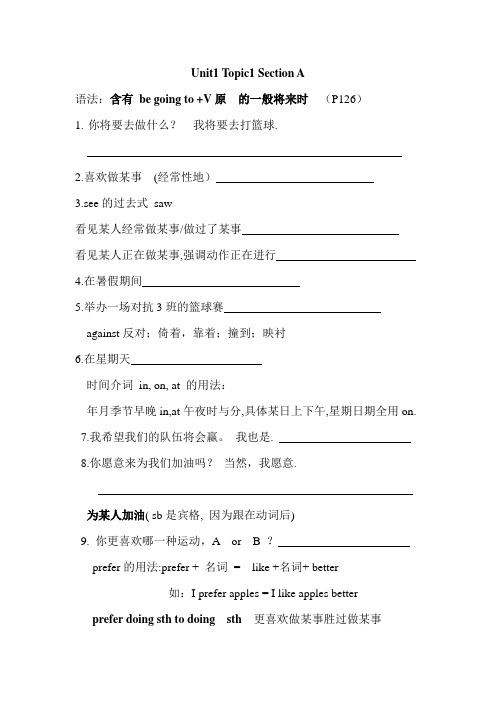
Unit1 Topic1 Section A语法:含有be going to +V原的一般将来时(P126)1.你将要去做什么?我将要去打篮球.2.喜欢做某事(经常性地)3.see的过去式saw看见某人经常做某事/做过了某事看见某人正在做某事,强调动作正在进行4.在暑假期间5.举办一场对抗3班的篮球赛against反对;倚着,靠着;撞到;映衬6.在星期天时间介词in, on, at 的用法:年月季节早晚in,at午夜时与分,具体某日上下午,星期日期全用on.7.我希望我们的队伍将会赢。
我也是.8.你愿意来为我们加油吗?当然,我愿意.为某人加油( sb是宾格, 因为跟在动词后)9. 你更喜欢哪一种运动,A or B ?prefer的用法:prefer + 名词= like +名词+ better如:I prefer apples = I like apples better prefer doing sth to doing sth 更喜欢做某事胜过做某事10.你划船多吗? 是的,非常多/ 不,很少。
(P2)11.你打算加入学校划船队吗?是的。
/不,我打算………(P2)13.区分:参加,加入(1)加入人或组织用:(2 ) 参加某项活动3个Unit1 Topic1 Section B1.你最喜欢什么运动?2.你最喜欢的运动员是谁?3.你知道关于他的一些事吗?4.他多高?他2.26米高。
(数词+名词+形容词)5.为…效力与…比赛和…玩6.我打算成为像他一样的篮球运动员。
7.那是我的梦想。
8.你长大后想当什么?我打算成为一名科学家。
(when引导时间状语从句,主将从现)What is he going to be when he grows up?9.在今后Unit1 Topic1 Section C1.非常喜欢2.骑自行车3.四“花费”①spend的两个词组(spend--spent)主语为人②pay for (pay--paid) 主语为人③cost (cost--cost)主语为物④take:It takes sb. some time to do sth. 主语为形式主语it4.爬山5.在体育馆6.擅长…7.学校运动会8.跳高9.跳远10.确信,确定(2个)①确定做某事be sure to do sth②对某事确定,有把握be sure of / about sth③be sure+that从句④be not sure+if / whether 从句11.There be句型的一般将来时结构:(there be中不能出现实义动词have)将有(2个)12.使某人/某物保持某种状态13.使某人做某事14.受…欢迎15.对什么有益反义词组16.全世界17.保持健康18.做某事的一个好方法19.她每天都在体育馆花费半小时锻炼。
仁爱英语九年级教材讲解Unit2知识点击

Unit 2 Topic 1 Section ANew wordsNew phrasesUseful expressions知识点击1.……and you could see bees and butterflies dancing.……你能看见蜜蜂和蝴蝶在飞舞。
see...doing意为“看见……正在做……",see 此处用作感官动词,可以加宾语再加宾补。
进口袋。
Andy saw his toy dog hidden behind the door.安他看见他的玩具狗被藏在门后。
【拓展】其他的感官动词,如hear,watc 也有类似的用法。
如:Tony heard someone singing songs in the next door.托尼听到有人正在隔壁房间唱歌。
Every day lots of people go to the Tian'anmen Square to watch the flag go up.每天很多人去天安门广场看升红旗。
2.The flowers and grass have gone!鲜花和绿草都消失了!go在此处为不及物动词,意为“不复存在,不见了”。
如:The pain has gone.疼痛消失了。
【链接】go还有“变得,进展”等意思。
如:The fish is going bad.鱼快变质了。
Everything goes well. 一切都好。
3.Look,there are several chemical factories pouring waste water into the stream.看,有几个化工厂正往小溪里排放废水。
(1)pour...into…意为"向……投入"。
如:The government has poured millions of yuan into education.政府在教育上投资数百万元。
仁爱英语八年级上册Unit2 Topic1 sectionB (共13张PPT)
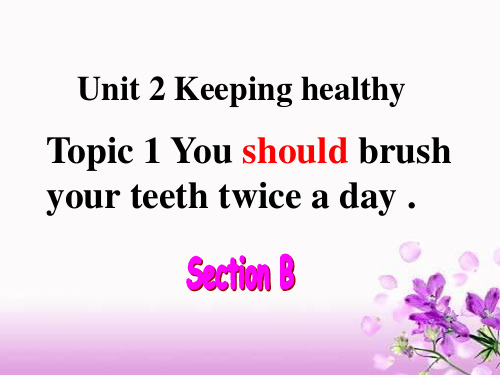
2 Not so well. I don’t feel like eating.
6 OK. Thank you.
5
I’m so sorry to hear that. Why don’t you have a good rest? You’d better not go to school today.
3 What’s wrong?
1.What’s the matter with Nick ? 2.What should he do ?
3.What shouldn’t he do ?
Give advice: 1. should do 2. had better do 3. shouldn’t do 4. had better not do
2. What’s Steve’s suggestion? A. Seeing a doctor. B. Taking some medicine. C. Going home and rest.
1.Steve looks well.( T )
2.Bruce has been ill for
two days. ( T )
______.
How lห้องสมุดไป่ตู้ng
like
A: I’m sorry to hear that. ____ _____ have you been ____
this?
better
B: Two days.
A: You maytahkaeve the flu. You’d ______ take some medicine. B: I think I will.
A: Shall I ______ you to the hospital?
仁爱版英语八年级上册Unit 2 Topic 1 Section B教案

1.She feels like running.她想要去跑步。
She ____ ___________.(同义转换)
2..我不想吃东西。
I ______ feel ___________.
3.You'd better tell him about it(改否定句).
You'd better _____ ______ him about it.
10.Iam feeling terrible.
11. sb. had better (not) do sth
12.Whydon’tyou…?
12.sb. had better (not) do sth
13.Whydon’tyou…?
目标
3:能够说出时间状语从句的结构及用法,并能熟练做题。
当堂训练:
1.take care of
3.need to
4.take pills
5.help sb (to) do
6.How long have been like this?
7.Iam feeling terrible.
8 sb. had better (not) do sth
9. Whydon’tyou…?
7. had better do
You had better go to see a doctor.
8. shouldn’t do
You shouldn’t eat too much candy.
9. had better not do
You’d better not work too long.
9.How long have been like this?
仁爱英语九上 1-2单元重点

Unit 1 Topic 1 Section A1.be happy to do sth 高兴做某事e back from 从...回来3.take place 发生(happen强调偶然性)4.so… that 如此.. 以致于...5.improve one’s English提高某人的英语水平6.have /has been to …. 去过...(已回来)7.have/ has gone to 去了...(还未回来)8.long time no see 好久不见1.How was your trip? 你的旅行怎样?2.Great changes have been taken place there and my hometown has become more and more beautiful. 那儿已经发生了很大的变化,我家乡已经变得越来越美丽了。
3.There were so many people that I couldn’t find a proper place to take photos. 那的人是如此之多,以致于我找不到适合拍照的地方。
4.Where have you been?你去过哪里(where地点副词,没有to)5.There goes the bell. = That’s the bell. = The bell is ringing. 铃响了。
6. It must be fun.那一定很有趣(must译为一定,肯定,表示推测)Unit 1 Topic 1 Section B1. take part in 参加2. volunteer activities 志愿者活动3.What a wonderful experience多么美好的经历4. learn…from 从……当中学习5. had (no) time to do sth.有(没)时间做……6. put on funny shows for sb为某人表演有趣的节目7. a group of 一组,一群8. something meaningful 一些有意义的事情9.jump rope 跳绳10.chat online 上网聊天11. do some farm work 干一些农活1.Though I had no time to travel, I still felt very happy.虽然我没有时间去旅游,但我仍然觉得很快乐。
Unit 2 Topic 1(随堂小测)2023-2024学年八年级英语上册同步精品课堂(仁爱版)
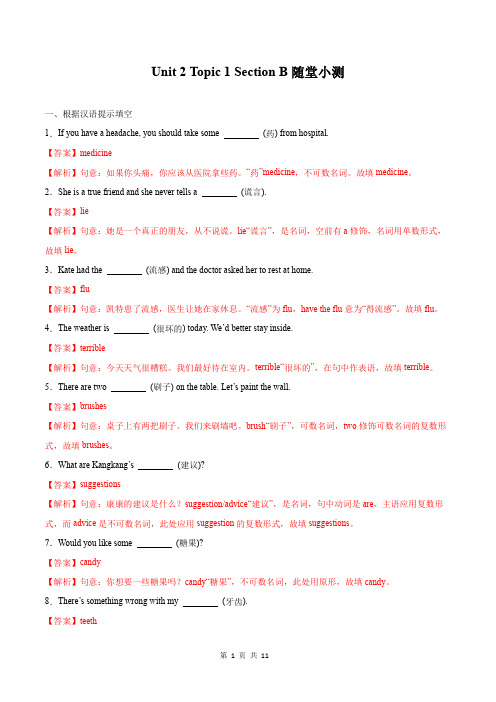
Unit 2 Topic 1 Section B随堂小测一、根据汉语提示填空1.If you have a headache, you should take some (药) from hospital.【答案】medicine【解析】句意:如果你头痛,你应该从医院拿些药。
“药”medicine,不可数名词。
故填medicine。
2.She is a true friend and she never tells a (谎言).【答案】lie【解析】句意:她是一个真正的朋友,从不说谎。
lie“谎言”,是名词,空前有a修饰,名词用单数形式,故填lie。
3.Kate had the (流感) and the doctor asked her to rest at home.【答案】flu【解析】句意:凯特患了流感,医生让她在家休息。
“流感”为flu,have the flu意为“得流感”。
故填flu。
4.The weather is (很坏的) today. We’d better stay inside.【答案】terrible【解析】句意:今天天气很糟糕。
我们最好待在室内。
terrible“很坏的”,在句中作表语,故填terrible。
5.There are two (刷子) on the table. Let’s paint the wall.【答案】brushes【解析】句意:桌子上有两把刷子。
我们来刷墙吧。
brush“刷子”,可数名词,two修饰可数名词的复数形式,故填brushes。
6.What are Kangkang’s (建议)?【答案】suggestions【解析】句意:康康的建议是什么?suggestion/advice“建议”,是名词,句中动词是are,主语应用复数形式,而advice是不可数名词,此处应用suggestion的复数形式,故填suggestions。
7.Would you like some (糖果)?【答案】candy【解析】句意:你想要一些糖果吗?candy“糖果”,不可数名词,此处用原形,故填candy。
仁爱版七年级英语上册 Unit 2 Topic 1 Section B 课件(共30张PPT)

学习目标
1、学习并掌握P29-30的生词。 2、熟读1a并总结掌握have/has的一般疑问句
的结构 。 3、复习形容词性物主代词,能用be动 词和
have/has两种表达方式描述人物外貌特征。
你预习了吗 / 'æ ktə / / 'feɪvərɪt/ / tʃaɪ'ni:z / /a:m/ / leg/ /fʊt/ /dʌz/ / hæ nd /
to the tone!
K: Michael, who is your favorite actor?
M: Guess . He is Chinese and he has a big
nose.
K: Does he have long hair?
M: No, he doesn’t.
一般疑问句
K: Does he have a wide mouth?
two arms
two hands
two legs
two feoeot
3 Look at the boy and write down
the name of each part.
( hair ) A
( eye ) B (nose) C
E (head)
F ( ear ) G ( face)
(mouth) D
Does he have long hair? ___________
Does it have a short neck? ___________________
Do they have long necks? ___________________
Game
Who is my favorite actor?
仁爱英语九年级 Unit2 Topic1 翻译
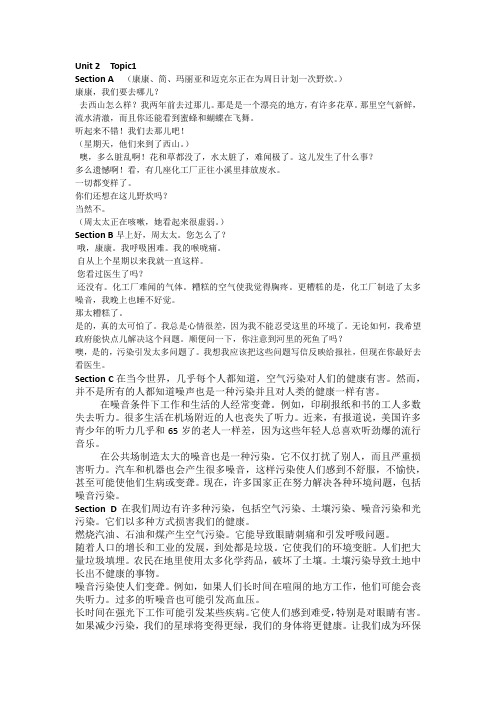
Unit 2 Topic1Section A (康康、简、玛丽亚和迈克尔正在为周日计划一次野炊。
)康康,我们要去哪儿?去西山怎么样?我两年前去过那儿。
那是是一个漂亮的地方,有许多花草。
那里空气新鲜,流水清澈,而且你还能看到蜜蜂和蝴蝶在飞舞。
听起来不错!我们去那儿吧!(星期天,他们来到了西山。
)噢,多么脏乱啊!花和草都没了,水太脏了,难闻极了。
这儿发生了什么事?多么遗憾啊!看,有几座化工厂正往小溪里排放废水。
一切都变样了。
你们还想在这儿野炊吗?当然不。
(周太太正在咳嗽,她看起来很虚弱。
)Section B早上好,周太太。
您怎么了?哦,康康。
我呼吸困难。
我的喉咙痛。
自从上个星期以来我就一直这样。
您看过医生了吗?还没有。
化工厂难闻的气体。
糟糕的空气使我觉得胸疼。
更糟糕的是,化工厂制造了太多噪音,我晚上也睡不好觉。
那太糟糕了。
是的,真的太可怕了。
我总是心情很差,因为我不能忍受这里的环境了。
无论如何,我希望政府能快点儿解决这个问题。
顺便问一下,你注意到河里的死鱼了吗?噢,是的,污染引发太多问题了。
我想我应该把这些问题写信反映给报社,但现在你最好去看医生。
Section C在当今世界,几乎每个人都知道,空气污染对人们的健康有害。
然而,并不是所有的人都知道噪声也是一种污染并且对人类的健康一样有害。
在噪音条件下工作和生活的人经常变聋。
例如,印刷报纸和书的工人多数失去听力。
很多生活在机场附近的人也丧失了听力。
近来,有报道说,美国许多青少年的听力几乎和65岁的老人一样差,因为这些年轻人总喜欢听劲爆的流行音乐。
在公共场制造太大的噪音也是一种污染。
它不仅打扰了别人,而且严重损害听力。
汽车和机器也会产生很多噪音,这样污染使人们感到不舒服,不愉快,甚至可能使他们生病或变聋。
现在,许多国家正在努力解决各种环境问题,包括噪音污染。
Section D在我们周边有许多种污染,包括空气污染、土壤污染、噪音污染和光污染。
它们以多种方式损害我们的健康。
Unit2Topic1单词短语句型 2021-2022学年仁爱版英语八年级上册

Section A单词:1.toothache n.牙痛2.dentist n.牙科医生3.backache n.背痛4.headache n.头疼5.suggest v.建议,提议6.fever n.发烧;发热7.cough n.& v.咳嗽8.stomachache n.胃疼9.have a cold 患感冒10.coffee n.咖啡11.tea n.茶;茶叶12.enough adj. 足够的,充分的adv.足够13.boil v.沸腾;烧开;煮……14.lift v.举起,抬起;(云.烟等)消散;n.(英)电梯Section A重点短语:1.brush one’s teeth 刷牙2.What’s wrong with…?What’s thematter /trouble with…?怎么啦?3.I’m sorry to hear that听到这个消息我很难过4.hear sb do sth 听见某人做某事5.hear sb doing sth听见某人正在做某事6.have a cold 感冒7.have a bad/terrible cold 患重感冒8.have a cough 患咳嗽9.have a fever 发高烧10.have a toothache 牙痛11.have a backache 背痛12.have a headache 头痛13.have a stomachache 胃痛14.see a dentist/doctor 看牙医/医生15.get well 恢复健康,好起来16.boiled water 白开水17.enough food/food enough足够的食物18.good enough 足够地好19.have a good sleep/sleep well好好睡一觉20.stay in bed 呆在床上,卧床休息Section A必背句式:1.What’s wrong / the matter / the trouble with you / her / him ?2.I have / She ( He ) has a fever.3.You should stay in bed and have a good sleep4.You shouldn’t drink coffee of tea in the evening.Section A汉译英练习:根据汉语意思完成英语句子,每空一词。
八年级英语上册Unit2Topic1YoushouldbrushyourteethtwiceadayPeriod4教学案例设计(新版)仁爱版
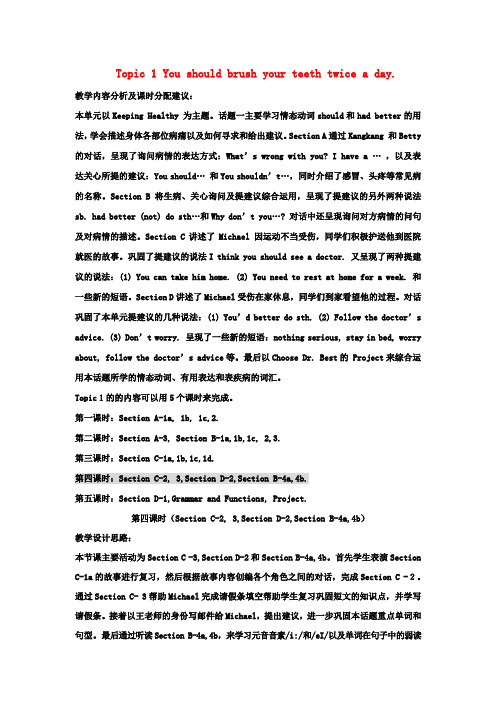
Topic 1 You should brush your teeth twice a day.教学内容分析及课时分配建议:本单元以Keeping Healthy 为主题。
话题一主要学习情态动词should和had better的用法,学会描述身体各部位病痛以及如何寻求和给出建议。
Section A通过Kangkang 和Betty 的对话,呈现了询问病情的表达方式:What’s wrong with you? I have a …,以及表达关心所提的建议:You should…和You shouldn’t…,同时介绍了感冒、头疼等常见病的名称。
Section B将生病、关心询问及提建议综合运用,呈现了提建议的另外两种说法sb. had better (not) do sth…和Why don’t you…? 对话中还呈现询问对方病情的问句及对病情的描述。
Section C讲述了Michael 因运动不当受伤,同学们积极护送他到医院就医的故事。
巩固了提建议的说法I think you should see a doctor. 又呈现了两种提建议的说法:(1) You can take him home. (2) You need to rest at home for a week. 和一些新的短语。
Section D讲述了Michael受伤在家休息,同学们到家看望他的过程。
对话巩固了本单元提建议的几种说法:(1) You’d better do sth. (2) Follow the doctor’s advice. (3) Don’t worry. 呈现了一些新的短语:nothing serious, stay in bed, worry about, follow the doctor’s advice等。
最后以Choose Dr. Best的 Project来综合运用本话题所学的情态动词、有用表达和表疾病的词汇。
仁爱版英语八年级上册UNIT 2 TOPIC 1 Section B 教案
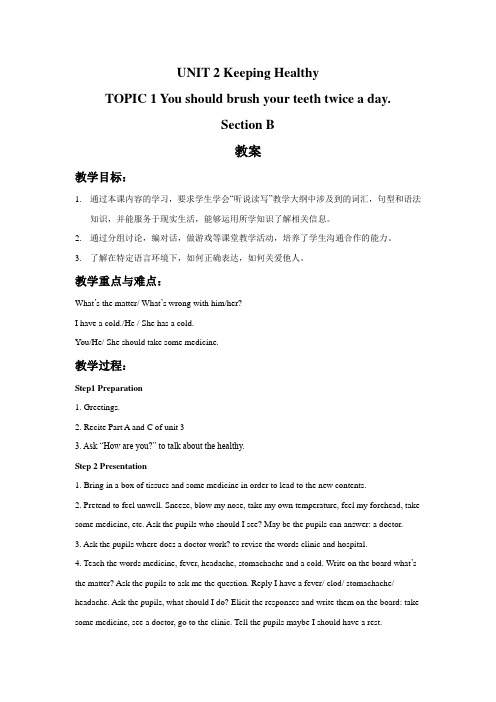
UNIT 2 Keeping HealthyTOPIC 1 You should brush your teeth twice a day.Section B教案教学目标:1.通过本课内容的学习,要求学生学会“听说读写”教学大纲中涉及到的词汇,句型和语法知识,并能服务于现实生活,能够运用所学知识了解相关信息。
2.通过分组讨论,编对话,做游戏等课堂教学活动,培养了学生沟通合作的能力。
3.了解在特定语言环境下,如何正确表达,如何关爱他人。
教学重点与难点:What’s the matter/ What’s wrong with him/her?I have a cold./He / She has a cold.You/He/ She should take some medicine.教学过程:Step1 Preparation1. Greetings.2. Recite Part A and C of unit 33. Ask “How are you?” to talk about the healthy.Step 2 Presentation1. Bring in a box of tissues and some medicine in order to lead to the new contents.2. Pretend to feel unwell. Sneeze, blow my nose, take my own temperature, feel my forehead, take some medicine, etc. Ask the pupils who should I see? May be the pupils can answer: a doctor.3. Ask the pupils where does a doctor work? to revise the words clinic and hospital.4. Teach the words medicine, fever, headache, stomachache and a cold. Write on the board what’s the matter? Ask the pupils to ask me the question. Reply I have a fever/ clod/ stomachache/ headache. Ask the pupils, what should I do? Elicit the responses and write them on the board: take some medicine, see a doctor, go to the clinic. Tell the pupils maybe I should have a rest.Demonstrate by putting my head on my arms on the desk. Add have a rest to the phrases on the board.5. Point to the dentist in the picture. Tell the pupils that dentists look after our teeth. Ask the pupils who visits the dentist? Those who visit the dentist should raise their hands.6. Ask the pupils to read the dentist’s advice aloud. Ask the pupils to point to the correct parts of the teeth on the pictures.7. Play the cassette for the pupils and ask them to say the sentences after the speaker.8. Ask the pupils what should we eat? and What shouldn’t we eat?Learn to distinguish healthy food for our teeth.Step 3 Revision1. Show the flashcards, review this unit.2. Have a dictation.3. Show the courseware, ask the pupils to read silently what doctor say.4. Show the pupils the close-up picture of the doctor’s notes. Play the cassette, ask the pupils to read the conversation aloud.5. Check the pupils know what advice the doctor has given. Ask them to write it in the blanks on the doctor’s note. Explain that we often give advice using should and need to.6. Play the cassette again and ask the pupils to check their work.Step 4 Have fun1. Play a guessing game. (look at the teacher’s gesture carefully, and give the correct name of ill. Then invite the other pupils instead of teacher.)2. Read the text together.Homework1. Copy the new words of this unit each four times.2. Finish the exercises in Koko Homework.3. Retell the story to the parents at home.。
仁爱版八年级上册同步练习Unit2 Topic1--Topic3分Section同步练习
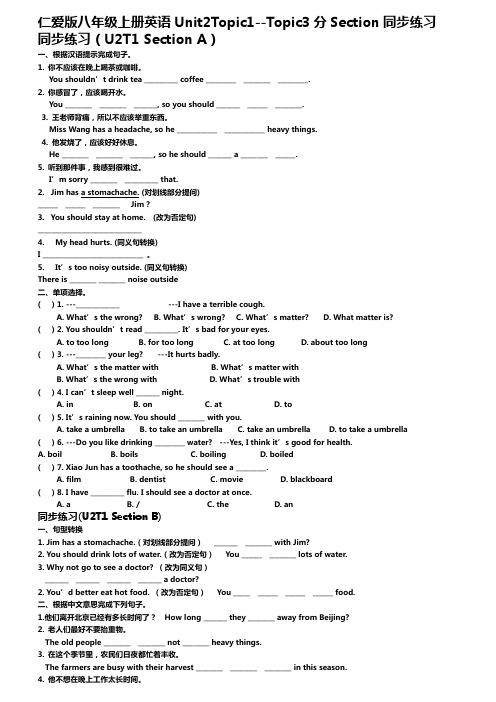
仁爱版八年级上册英语Unit2Topic1--Topic3分Section同步练习同步练习(U2T1 Section A)一、根据汉语提示完成句子。
1. 你不应该在晚上喝茶或咖啡。
You shouldn’t drink tea __________ coffee _________ ________ _________.2. 你感冒了,应该喝开水。
You ________ ________ _______, so you should _______ ______ ________.3. 王老师背痛,所以不应该举重东西。
Miss Wang has a headache, so he ____________ ____________ heavy things.4. 他发烧了,应该好好休息。
He ________ ________ _______, so he should _______ a ________ ______.5. 听到那件事,我感到很难过。
I’m sorry ________ __________ that.2.Jim has a stomachache. (对划线部分提问)______ ______ ________ Jim?3.You should stay at home. (改为否定句)_______________________________4.My head hurts. (同义句转换)I ______________________________ 。
5.It’s too noisy outside. (同义句转换)There is ________ ________ noise outside二、单项选择。
( ) 1. ---_____________ ---I have a terrible cough.A.What’s the wrong?B. What’s wrong?C. What’s matter?D. What matter is?( ) 2. You shouldn’t read __________. It’s bad for your eyes.A.to too longB. for too longC. at too longD. about too long( ) 3. ---_________ your leg? ---It hurts badly.A.What’s the matter withB. What’s matter withB.What’s the wrong with D. What’s trouble with( ) 4. I can’t sleep well _______ night.A.inB. onC. atD. to( ) 5. It’s raining now. You should ________ with you.A.take a umbrellaB. to take an umbrellaC. take an umbrellaD. to take a umbrella ( ) 6. ---Do you like drinking _________ water? ---Yes, I think it’s good for health.A.boilB. boilsC. boilingD. boiled( ) 7. Xiao Jun has a toothache, so he should see a _________.A.filmB. dentistC. movieD. blackboard( ) 8. I have __________ flu. I should see a doctor at once.A.aB. /C. theD. an同步练习(U2T1 Section B)一、句型转换1. Jim has a stomachache.(对划线部分提问)_______ ________ with Jim?2. You should drink lots of water.(改为否定句)You ______ ________ lots of water.3. Why not go to see a doctor? (改为同义句)_______ _______ _______ _______ a doctor?2.You’d better eat hot food. (改为否定句)You _____ ______ ______ ______ food.二、根据中文意思完成下列句子。
仁爱版英语八年级上二单元一话题集体备课

课程标准要求
能在听读看的过程中,围绕语篇内容记录重点信息,整体理解和简要概括主要内容;能根据听到或读到的关键词对人物、地点、事件等进行推断;能根据读音规则和音标拼读单词;能分析和梳理语篇结构。
学习目标
学生通过改述、课堂学习以及练习的方式掌握情态动词should和shouldn’t的用法以及转换,能明确给出建议。
教学方法:3P教学法
教学流程:
一、导入:If your friendsfell down, what do you want to do for them? Do youremembersomething about mistakes in your daily life?
二、读前(Pre-reading)
授课内容
Unit 2Topic1Section D
授课教师
一、学习目标:1.能正确运用本单元所学内容、比较流利对同学表达关心建议。
2. 能阅读有关疾病的文章,理解文章大意,并能做出相关的阅读练习
3. 能综合运用本单元的语法、词汇、句型写出对同学的关心,并且能够写信表达自己对疾病的建议。
二、 知识目标:能正确拼读并运用单词表中的单词和短语
话题分析
话题教材分析
本话题属于“人与社会”这一主题,围绕健康这一核心,向学生介绍了疾病,健康习惯,流感等相关内容,以及如何处理在活动中生病了之后如何处理。
话题知识分析
学习关于疾病的单词,运用情态动词should和shouldn’t来提出建议,以及如何去描述疾病。
学情分析
学生以前除了上个话题得ill,完全没有接触过与疾病相关的内容;理解概括能力基本缺失。
三、素养目标:通过阅读,学生能够从中了解同学之间如何互相帮助,并且能够积累关于说明写作的相关内容,为以后的书写打下揭示的基础。
- 1、下载文档前请自行甄别文档内容的完整性,平台不提供额外的编辑、内容补充、找答案等附加服务。
- 2、"仅部分预览"的文档,不可在线预览部分如存在完整性等问题,可反馈申请退款(可完整预览的文档不适用该条件!)。
- 3、如文档侵犯您的权益,请联系客服反馈,我们会尽快为您处理(人工客服工作时间:9:00-18:30)。
Watch the flash and mark T(True) or F (False).
视频1a-P29
What’s wrong?
3
Pair work
Make conversations after the example. Example: What’s wrong/the matter with you? I have a toothache. You shouldn’t eat too much candy. / You should brush your teeth twice a day.
1.Steve looks well.
(T )
2.Bruce has been ill for two days. 4.Bruce will take some medicine.
3.Steve will take Bruce to the hospital. ( F )
(T ) (
T)
Read 1a and fill in the blanks. matter A: Hey, Bruce. You don’t look well. What’s the _______? headache cough B: Well, I’m feeling terrible! I have a _________ and a ______. How long like A: I’m sorry to hear that. ____ _____ have you been ____ this? better B: Two days. A: You may have the flu. You’d ______ take some medicine. take B: I think I will. A: Shall I ______ you to the hospital? B: No, thank you. I’ll go home and have a rest.
• teribble
-How t_____!The car may hit you when you cross the road. -Thank you!
flu
have the flu
• medicine If you have a cold ,you'ห้องสมุดไป่ตู้ better take some medicine.
• day and night • He coughs day and night .
• candy Mom bought all kinds of candies for me.
• brush • I brush my teeth twice a day . • She brush her teeth three times a day.
• tooth ---- teeth • lie lie down • You have a backache,you must lie down and have a rest.
• 1 Don't eat too much c_____ .It's bad for your teeth. • 2 We should b____ our teeth at least twice a day. • 3 He may have the f ___ .He feels terrible. • 4 You 'd better take some m_____ . • 5 The weather was so t_____ .It rained all day.
2
Number the sentences to make up a conversation similar to 1a. How are you feeling, Nick? I have a terrible cold. I cough day and night.
1
4
2 Not so well. I don’t feel like eating. 6 OK. Thank you. I’m so sorry to hear that. Why don’t you have a 5 good rest? You’d better not go to school today. 3
• suggest--- suggestion suggestion 与advice 的区别。 suggestion为可数名词 如:a suggestion ,two suggestions ,some suggestions advice为不可数名词,一则建议a piece of advice ,两则建议two pieces of advice
最好做某事
What’s the matter with him? He ____________ had better not drink cold water.
最好不要做某事
He has a stomachache.
What’s the matter with her? She had ____________ better not lift heavy things.
She has a backache.
1b Listen to 1a and choose the correct
answers.
录音1a-P29
1. —What’s wrong with Bruce? — He has _____. A. a toothache B. a fever C. a headache and a cough
He has a cold. What’s wrong with him?
He should drink more water.
She has a toothache.
What’s wrong with her? She shouldn’t eat too much chocolate.
He has a fever. What’s wrong with him? He had better see a doctor.
